
The Best Free Stock Image Sites for Amazing Visuals
Discover the best free stock image sites for stunning, high-quality photos. Our guide compares licensing, features, and use cases to help you choose.
Discover the best AI tools for marketing. We compare 12 top platforms with features, pricing, and pros/cons to help you automate and enhance your strategy.

Instastock Team
November 7, 2025 • 15 min read
Feeling the pressure to do more with less? You're not alone. Marketers are constantly searching for ways to work smarter, not harder. The good news is that artificial intelligence is no longer a futuristic concept; it's a practical toolkit that can revolutionise your daily workflow. The best AI tools for marketing can help you generate stunning visuals in seconds, automate repetitive tasks, and personalise customer journeys at scale.
But with countless options flooding the market, choosing the right platform can feel overwhelming. We've done the research for you. This guide cuts through the noise, offering an in-depth look at the top tools available today. We'll analyse their unique strengths, honest limitations, and specific use cases to help you find the perfect fit. To truly understand the power AI brings to tailor experiences, you can explore modern marketing tips powered by Artificial Intelligence Personalization before diving into our list.
Whether you're a freelance designer, part of a growing startup, or leading an enterprise team, you'll find solutions here to drive real results. Each review includes helpful screenshots and direct links, so you can easily compare and decide which tools will help you innovate, save time, and hit your campaign goals.
Instastock earns its top spot as one of the best AI tools for marketing by solving a persistent problem for creative teams: the need for unique, high-quality visuals without the hassle of complex licensing. This AI-powered image platform empowers marketers, designers, and creators to generate custom assets they fully own, eliminating usage restrictions and future fees. Its intuitive interface is designed for speed, allowing anyone to produce compelling visuals in seconds.
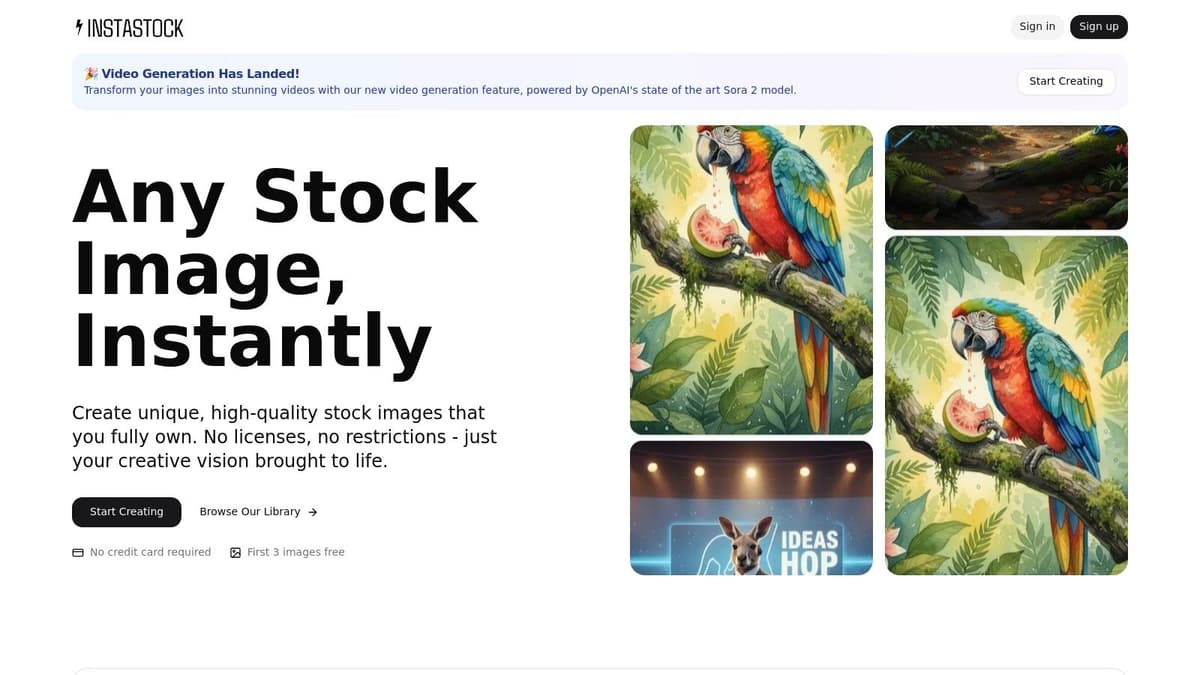
What truly sets Instastock apart is its collaborative AI editor. Instead of just generating a static image, you can refine it using natural language. Simply type instructions like "change the background to a modern office" or "make the person's shirt blue" and the AI adjusts the composition, behaving like a human design partner. This streamlines the creative process, removing the need for manual Photoshop edits for many common adjustments. You can learn more about how this technology works by reading Instastock's guide on how to generate images with AI.
The platform also includes a powerful one-click image-to-video feature, powered by OpenAI's Sora 2 model, that transforms your static images into short, dynamic videos perfect for social media ads, reels, or presentations.
Instastock offers a risk-free entry point with a free trial that includes starter credits (the website mentions both three and five free images, so check the sign-up page for the current offer) and requires no credit card. This makes it easy for teams to test the platform's capabilities before committing.
Website: https://instastock.studio
While not an AI tool itself, G2 is an indispensable resource for finding the best AI tools for marketing. Think of it as your strategic starting point. It’s a vast software marketplace featuring thousands of verified, in-depth user reviews that cut through the marketing fluff.
Instead of just listing features, G2 allows you to see how real marketing teams are using AI software. Its powerful filtering system lets you narrow down options by company size (from SMB to Enterprise), specific marketing functions like "AI Writing Assistants," and user satisfaction ratings. The regularly updated category taxonomy means you can quickly find emerging AI solutions you might not have known existed. This platform helps you build a shortlist of tools that genuinely match your team's needs and budget.
Key Takeaway: G2's strength lies in its verified user reviews and robust comparison grids, offering a transparent look at how tools perform in real-world scenarios.
Website: https://www.g2.com/categories/marketing-automation
Similar to G2, Capterra UK serves as a crucial discovery platform rather than a direct AI tool. Its unique advantage for UK-based marketers is its regional focus, which provides essential context on pricing, VAT, and local vendor relevance that broader, US-centric sites often miss. It’s a directory designed to help you find the best AI tools for marketing with a clear view of how they operate within the UK market.
The platform excels at helping you create shortlists of relevant generative AI software. Its filters allow you to compare features side-by-side, and it provides direct links to free trials and vendor pages. Capterra also offers valuable editorial research on GenAI usage, risks, and labelling specifically for UK marketing teams, making it a well-rounded resource for informed decision-making.
Key Takeaway: Capterra UK's strength is its UK-specific market focus, offering clarity on local pricing and vendor presence for better-informed software procurement.
Website: https://www.capterra.co.uk/directory/34155/generative-ai/software
Product Hunt is the go-to discovery platform for what’s new and next in the tech world, making it an essential resource for finding cutting-edge AI tools for marketing. Every day, new products launch on the site, many of which are innovative AI solutions that haven't yet hit mainstream platforms like G2. It’s a space where you can see what’s trending, explore curated collections, and get a first look at tools before your competitors do.
The platform thrives on its community. Launch pages feature product demos, maker commentary, and unfiltered feedback from early adopters. This allows you to assess a tool's potential and see initial user reactions in real-time. For marketers seeking to stay ahead of the curve, Product Hunt offers a daily dose of inspiration and a direct line to the newest AI-powered marketing technologies, from niche content generators to sophisticated analytics platforms.
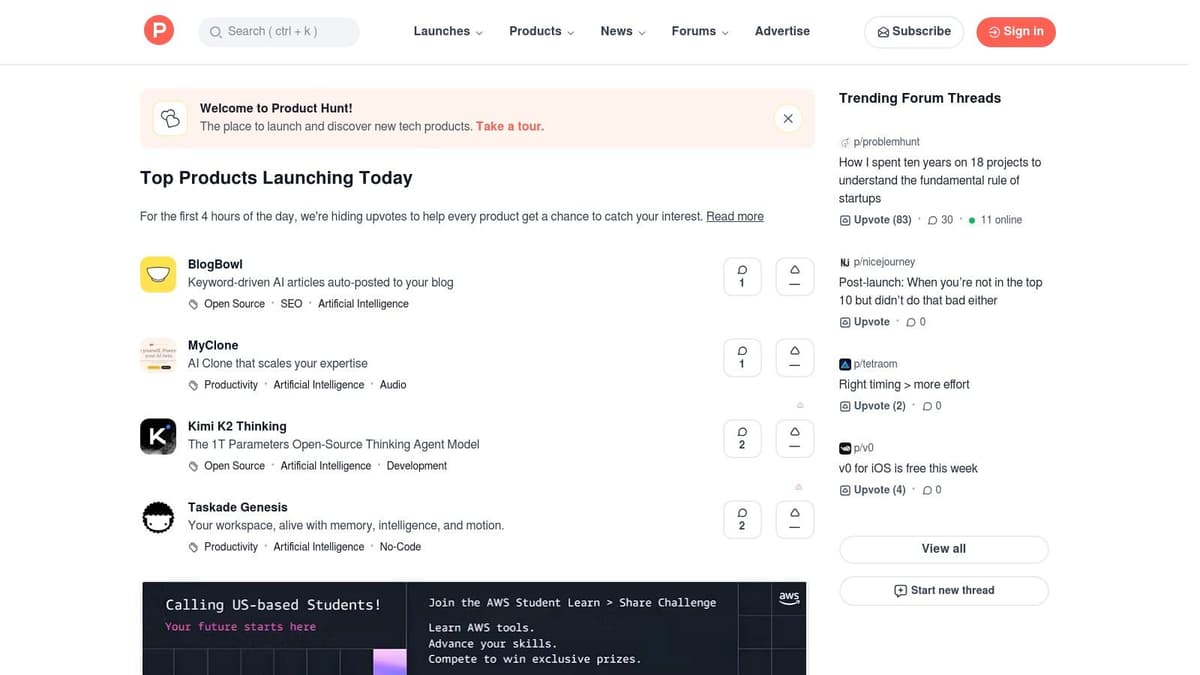
Key Takeaway: Product Hunt is unmatched for discovering brand-new and emerging AI tools, offering a real-time pulse on marketing tech innovation driven by community feedback.
Website: https://www.producthunt.com
For e-commerce businesses, the Shopify App Store is less a single tool and more an entire ecosystem of the best AI tools for marketing, all designed to plug directly into your online store. It's the central hub for discovering AI-powered apps that handle everything from generating compelling product descriptions to automating social media ads and optimising your store for search engines. This makes it a one-stop-shop for enhancing your marketing without ever leaving the Shopify environment.
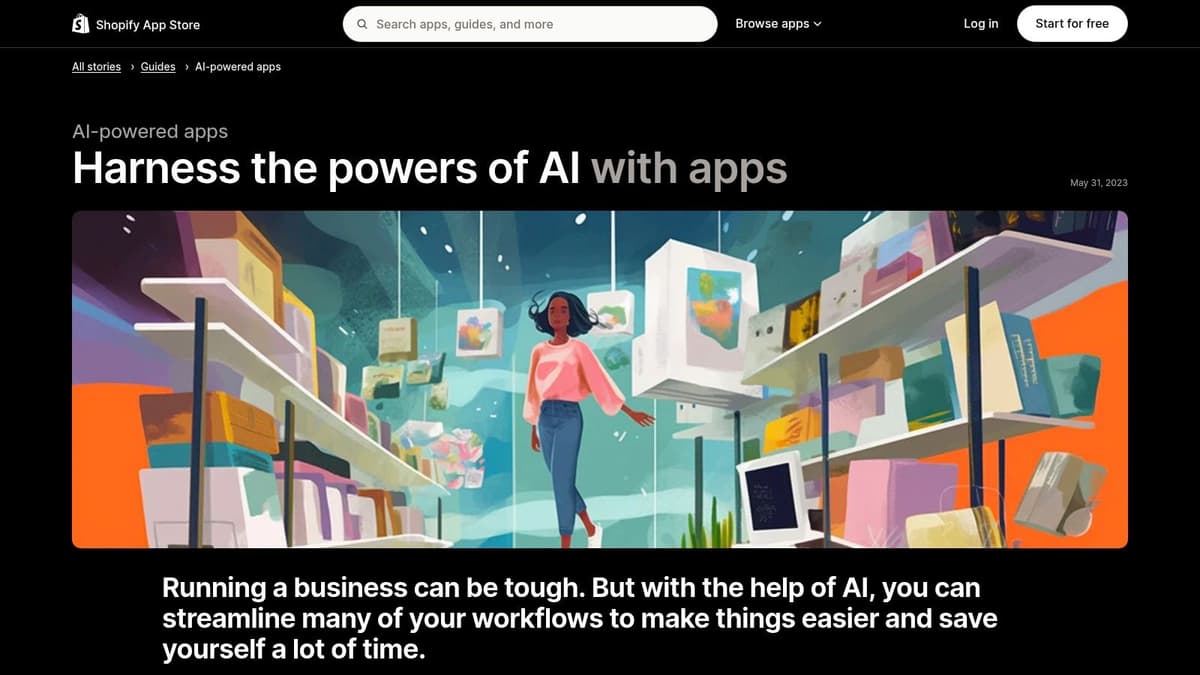
The platform curates apps into helpful categories, like 'AI-powered apps', and often highlights emerging solutions. Because the apps are built for Shopify, they integrate seamlessly with your product catalogue, customer data, and analytics, providing a level of cohesion you can't get from standalone tools. It also simplifies billing and management, as most apps are charged directly through your main Shopify subscription.
Key Takeaway: The Shopify App Store's power lies in its direct integration, allowing e-commerce marketers to deploy specialised AI tools that work seamlessly with their existing store data.
Website: https://apps.shopify.com/stories/guide-ai-powered-apps
HubSpot is an all-in-one CRM platform that has deeply integrated AI into its Marketing Hub, making it one of the best AI tools for marketing teams seeking a unified system. It's designed to reduce the need for multiple point solutions by offering a centralised suite where AI assists with content creation, social media scheduling, and even prospecting. This consolidation simplifies workflows and ensures data flows seamlessly from marketing to sales.
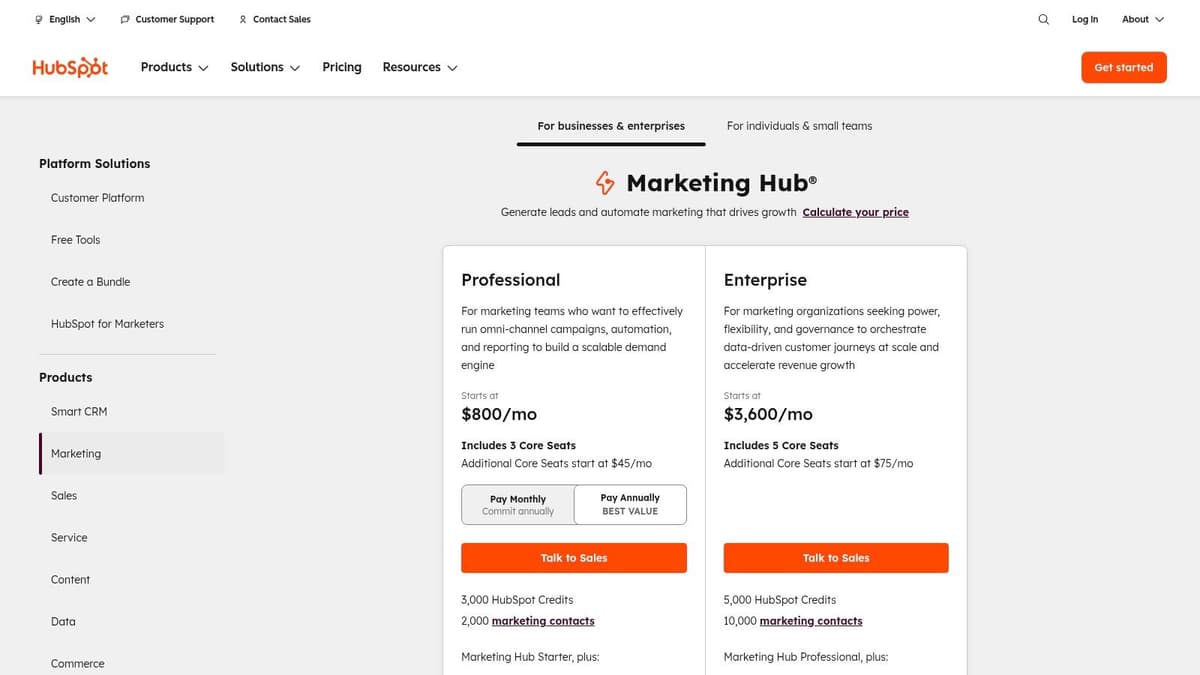
The platform uses AI agents to help marketers draft blog posts, generate social copy, and build smarter automation sequences. For growing teams, its true power lies in the native CRM integration, which provides a single source of truth for customer journeys and simplifies the handoff of marketing-qualified leads to the sales team, all within one ecosystem. Higher-tier plans unlock sophisticated reporting and attribution features.
Key Takeaway: HubSpot's strength is its unified CRM and AI toolset, allowing teams to manage the entire customer lifecycle from a single, data-rich platform.
Website: https://www.hubspot.com/pricing/marketing
Jasper is an AI content platform built specifically for marketing teams to generate on-brand copy and complete campaign assets. It excels at moving beyond simple text generation by incorporating your specific brand voice and knowledge, ensuring everything from ad copy to blog posts and emails remains consistent and brand-safe. This focus on brand integrity makes it one of the best AI tools for marketing departments that need to scale content without sacrificing their unique identity.
It allows you to inject your style guides, product catalogues, and company facts directly into the AI. This means the content it creates isn't just generic; it's informed by your actual business context, making it far more relevant and ready to publish.
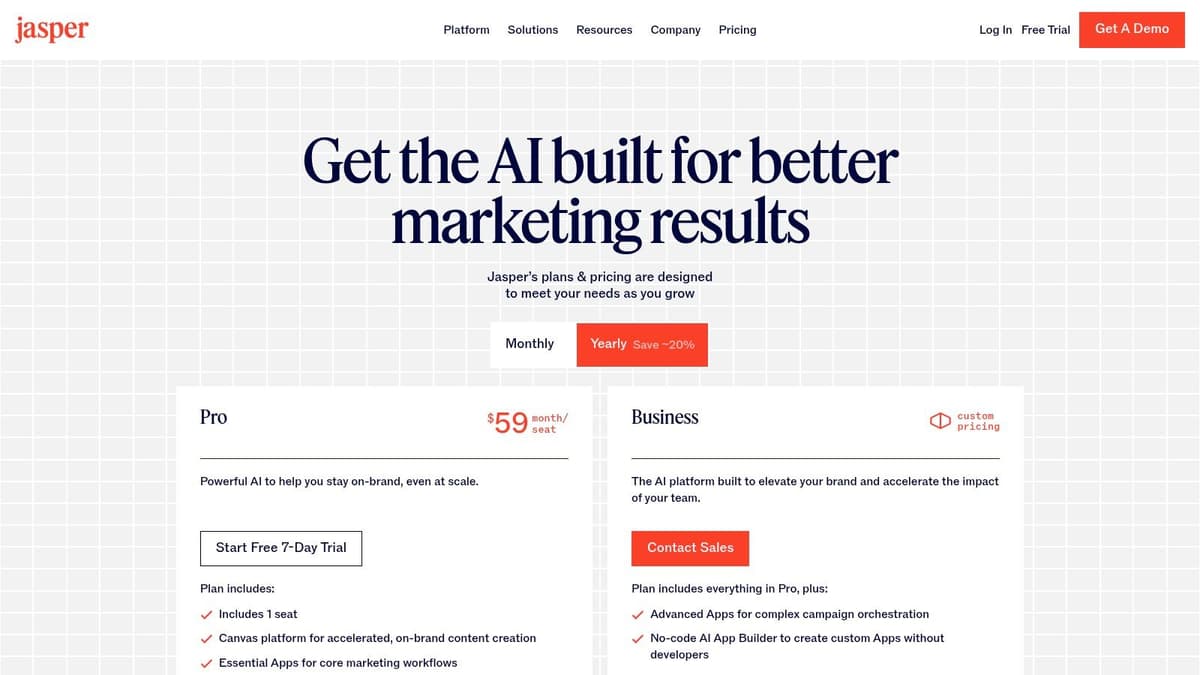
Key Takeaway: Jasper's core strength is its brand-aware content generation, enabling teams to produce a high volume of assets that genuinely reflect their established voice and knowledge base.
Website: https://www.jasper.ai/pricing
Semrush is a titan in the marketing world, evolving its powerful SEO and content suite into a hub for AI-driven marketing insights. While known for its legendary keyword research and competitor analysis, it now integrates AI features across its toolkits, making it one of the best AI tools for marketing for teams needing an all-in-one solution. Its strength is in connecting data points from SEO, content, social media, and PR into a single, cohesive strategy.
The platform's App Centre allows you to bolt on specialised AI tools like the AI Social Assistant, which helps you generate post ideas and schedule content. For those all-in on the future of search, the Semrush One bundle packages AI-powered features together. This approach lets you customise your toolkit, adding AI capabilities where your team needs them most without overhauling your entire workflow.
Key Takeaway: Semrush excels by embedding AI into a comprehensive, data-rich marketing platform, allowing you to enhance existing SEO and content strategies rather than starting from scratch.
Website: https://www.semrush.com
Mailchimp has long been a go-to platform for email marketing, but its recent integration of AI makes it a powerful contender among the best AI tools for marketing, especially for small to medium-sized enterprises. Its AI-powered Creative Assistant can generate entire email designs, subject lines, and body copy based on your campaign goals, industry, and brand voice, dramatically speeding up content creation. This makes sophisticated marketing accessible without a dedicated design team.
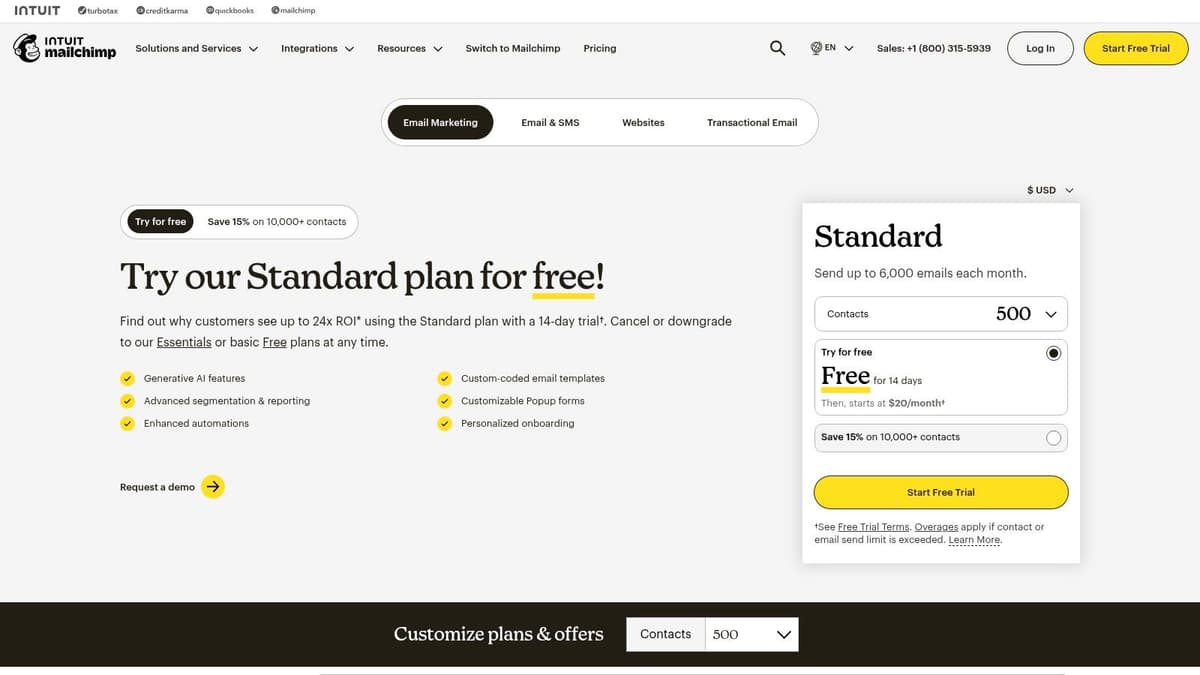
The platform shines with its user-friendly interface and robust automation features, allowing you to build complex customer journeys. For UK-based businesses, Mailchimp offers the convenience of billing in GBP, simplifying accounting. Its tiered plans, including a free option and pay-as-you-go credits, provide excellent flexibility as your business scales.
Key Takeaway: Mailchimp's strength is its AI-assisted creative suite combined with flexible, SME-friendly billing options, including GBP support.
Website: https://mailchimp.com/pricing/
Adobe Marketo Engage is an enterprise-grade powerhouse for marketing automation, designed for large organisations that need deep scalability and sophisticated control. It moves beyond basic email campaigns by leveraging AI to power predictive audiences, personalise customer journeys in real-time, and analyse complex multi-touch attribution. This makes it one of the best AI tools for marketing at scale.
For teams managing intricate campaigns across multiple channels, Marketo provides robust governance and deep native integrations with major CRMs like Salesforce. Its AI capabilities focus on optimising the entire customer lifecycle, from initial lead scoring to nurturing and conversion, helping teams understand exactly which efforts are driving revenue.
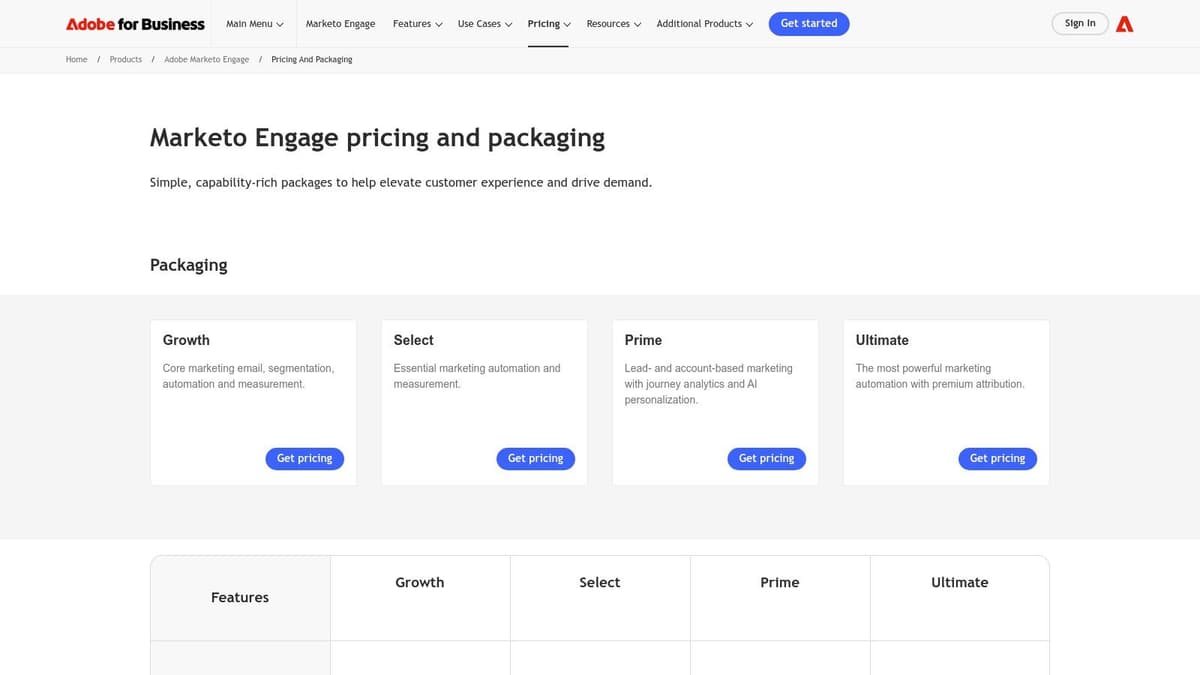
Key Takeaway: Marketo Engage’s strength is its enterprise-level scalability and advanced AI-driven journey analytics, making it ideal for complex B2B marketing operations.
Website: https://business.adobe.com/products/marketo/pricing.html
For teams embedded in the Salesforce ecosystem, the AppExchange is the primary destination for finding AI-powered marketing tools designed to work seamlessly with your CRM. It’s a vast marketplace where you can discover over 260 marketing apps, from specialised AI assistants to comprehensive attribution platforms, all vetted for Salesforce integration.
This isn't just a list; it's a curated ecosystem. You can filter by price, language, and your specific Salesforce edition to find solutions that plug directly into your existing workflows. The emergence of Agentforce and the AgentExchange partner marketplace also signals a growing focus on dedicated, pre-built AI agents, making it easier to deploy sophisticated automation without extensive development.
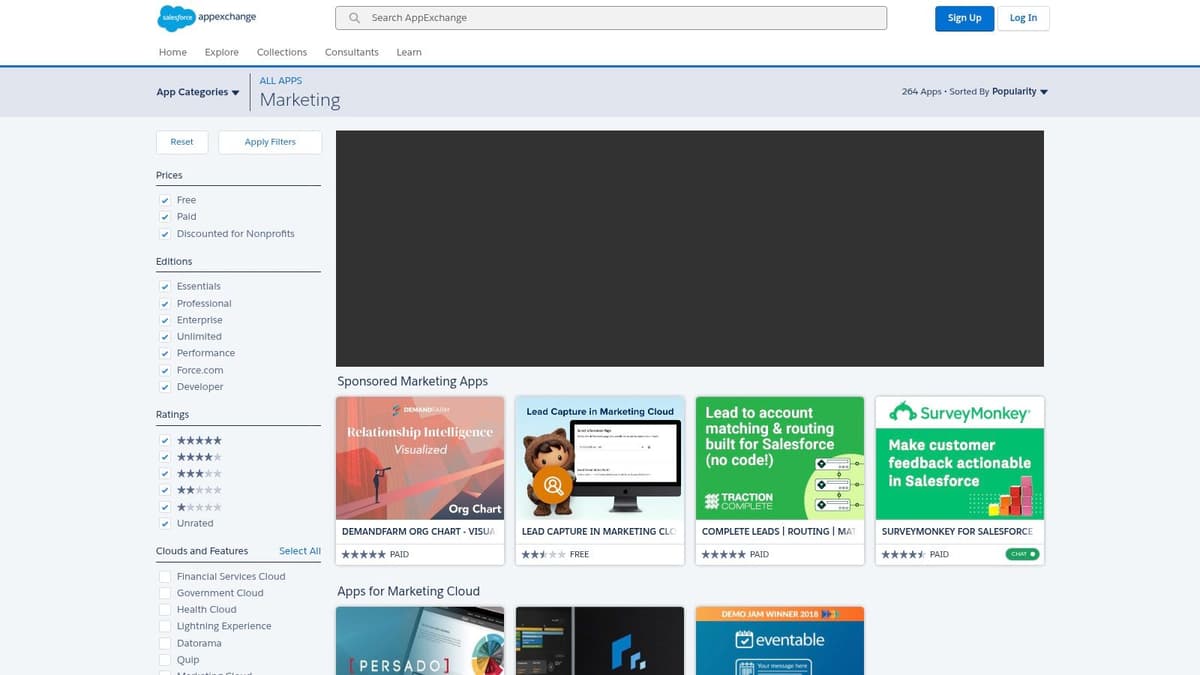
Key Takeaway: The AppExchange offers certified, enterprise-ready AI solutions that guarantee deep integration with your Salesforce data, providing a single source of truth for your marketing efforts.
Website: https://appexchange.salesforce.com/category/marketing/
Phrasee moves beyond generic text generation to focus exclusively on optimising brand-safe marketing language. It's an enterprise-grade AI platform designed to create, test, and automate high-performing copy for email subject lines, push notifications, and social media ads. Its core strength is learning your brand voice and then generating language that is not only compliant but also scientifically engineered to drive higher engagement and conversions.
This tool is one of the best AI tools for marketing because it provides real-time personalisation and performance insights, removing the guesswork from copywriting. For large teams, it ensures brand consistency at scale by connecting directly with marketing platforms like Braze, making the workflow seamless from creation to deployment.
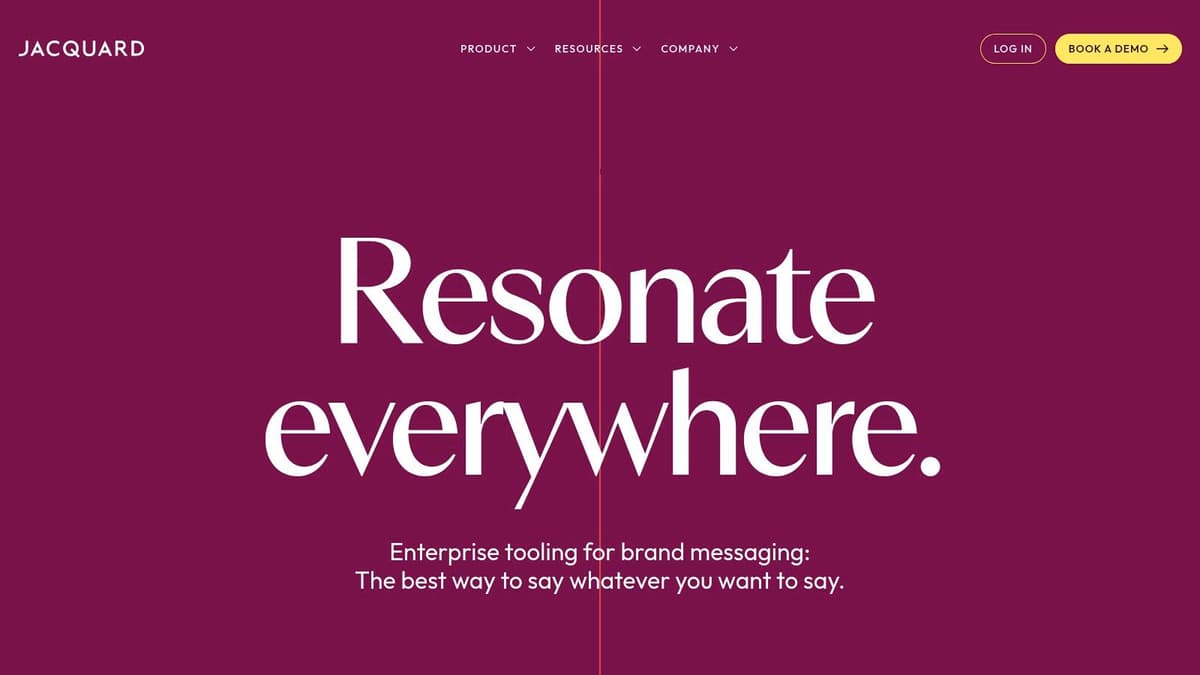
Key Takeaway: Phrasee's unique selling point is its data-driven approach to brand language, creating copy that is scientifically proven to perform better than human-written alternatives.
Website: https://phrasee.co
| Product | Core features | Quality / UX (★) | Value & Pricing (💰) | Target audience (👥) | Unique selling points (✨) |
|---|---|---|---|---|---|
| Instastock 🏆 | AI image generator; NL editor; one‑click style & image→video | ★★★★★ — fast, intuitive | 💰 Free starter credits (3–5); affordable plans | 👥 Marketing teams, creators, startups | ✨ Full ownership (no licenses); AI editor like a human collaborator |
| G2 | Marketplace of verified reviews, rankings & comparison grids | ★★★★☆ — trusted review data | 💰 Free to browse; vendor pricing varies | 👥 Buyers researching software | ✨ Verified user reviews + comparison tools |
| Capterra UK | UK‑focused directory; filters, shortlists, vendor links | ★★★★☆ — regional clarity | 💰 Free directory; vendor pricing & VAT shown | 👥 UK buyers, agencies | ✨ UK pricing/VAT context and editorial guidance |
| Product Hunt | Daily launches; community feedback, demos & comments | ★★★☆☆ — early‑stage signals | 💰 Free discovery; quality varies | 👥 Makers, early adopters, scouts | ✨ Surface niche/new tools and early user impressions |
| Shopify App Store | Curated apps, install via Shopify, clear billing | ★★★★☆ — ecommerce‑centric UX | 💰 Mixed (free→paid); billed via Shopify | 👥 Ecommerce merchants, app developers | ✨ Native storefront & checkout integrations |
| HubSpot (Marketing Hub) | CRM + AI agents, automation, analytics | ★★★★☆ — mature, polished UX | 💰 Tiered plans (Starter→Enterprise) | 👥 Mid→large marketing teams | ✨ Unified CRM + marketing stack; strong reporting |
| Jasper | AI copy + brand voice controls; collaboration tools | ★★★★☆ — marketing‑focused output | 💰 Per‑seat plans; trial available | 👥 Marketing teams, content creators | ✨ Brand voice & knowledge injection for consistency |
| Semrush | SEO, content, PR, social toolkits + AI add‑ons | ★★★★☆ — comprehensive toolkit | 💰 Modular toolkits; can be costly | 👥 SEO/content teams, agencies | ✨ Broad marketing coverage + App Center add‑ons |
| Mailchimp | Email/SMS automation; AI creative assistant & templates | ★★★★☆ — SME‑friendly | 💰 Free→Premium tiers; PAYG options | 👥 SMEs, freelancers | ✨ Flexible billing and rich templates |
| Adobe Marketo Engage | Enterprise automation, personalization, journey analytics | ★★★★☆ — enterprise‑grade | 💰 Quote‑based; high total cost | 👥 Large enterprises | ✨ Deep integrations, advanced attribution |
| Salesforce AppExchange (Marketing) | Marketplace of 260+ marketing apps; filters & trials | ★★★★☆ — enterprise vetted | 💰 Many free→paid; requires Salesforce | 👥 Salesforce customers, enterprises | ✨ Large ecosystem of integrated apps |
| Phrasee | AI for marketing language optimization & personalization | ★★★★☆ — performance‑driven | 💰 Enterprise pricing via sales | 👥 Retail/ecommerce & enterprise marketers | ✨ Real‑time language optimization and compliance |
Navigating the world of AI marketing tools can feel overwhelming, but hopefully, this guide has illuminated the path. We’ve explored a diverse range of platforms, from comprehensive suites like HubSpot and Adobe Marketo Engage to specialised powerhouses like Jasper for content creation and Phrasee for brand-safe language. The central theme is clear: AI is no longer a futuristic concept but a practical, powerful ally for modern marketers.
The goal isn't to adopt every shiny new tool that comes along. Instead, it's about strategic integration. The best AI tools for marketing are the ones that solve your most pressing challenges, whether that's automating email campaigns with Mailchimp, uncovering competitor strategies with Semrush, or generating unique visual assets with Instastock. True success comes from augmenting your team's creativity and expertise, not replacing it. By letting AI handle the data-heavy, repetitive tasks, you free up your team to focus on strategy, innovation, and building genuine customer relationships.
So, where do you begin? Start by performing a simple audit of your current marketing workflow. Identify the bottlenecks and the areas where your team spends the most time on manual, low-impact tasks.
Don't feel pressured to implement a dozen new tools at once. The most effective approach is incremental. Choose one or two key areas to focus on first. Make the most of free trials and demos to get a feel for a tool's interface and capabilities before committing. Involve your team in the decision-making process; the tools that get adopted are the ones that people genuinely find useful.
As you build your ideal AI marketing stack, don't overlook innovative, specialised solutions that can address unique needs; for instance, exploring tools like Shortgenius might reveal new efficiencies in video marketing that you hadn't considered. The landscape of AI is constantly evolving, so maintaining a curious and experimental mindset will serve you well. By thoughtfully selecting and implementing the best AI tools for marketing, you're not just staying current; you're building a more efficient, intelligent, and impactful marketing engine for the future.
Ready to revolutionise your visual content strategy? Stop spending hours searching for the perfect, uninspired stock photo and start creating unique, on-brand visuals in seconds. Try Instastock today and see how AI-powered image and video generation can elevate your brand and save you valuable time.
Get Started with Instastock for Free

Discover the best free stock image sites for stunning, high-quality photos. Our guide compares licensing, features, and use cases to help you choose.

Master product photography for ecommerce with our friendly guide. Learn to plan, shoot, and edit stunning product photos that drive sales for your online store.

Discover how a fashion illustration template can transform your design workflow. Learn to choose, use, and elevate templates with AI for professional results.